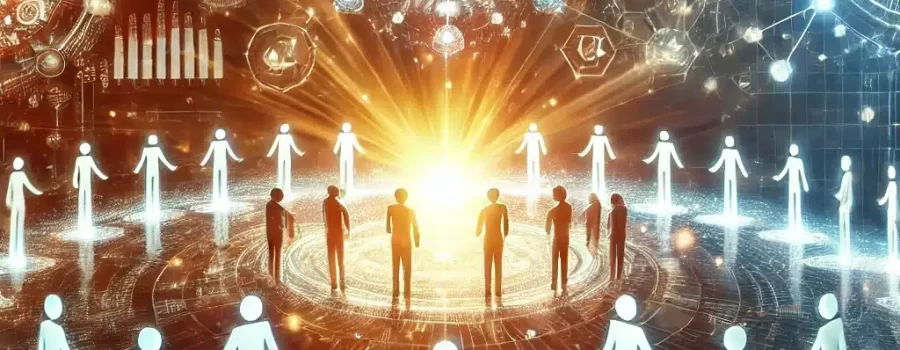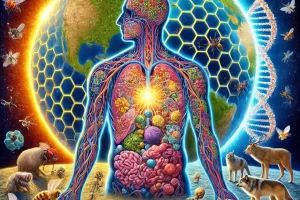Introduction: AI as Part of the Collective
As artificial intelligence (AI) becomes more integrated into our lives, the debate around its role in society intensifies. Many view AI as either a tool to be controlled or a potential threat to human autonomy. However, through the lens of The Principle of Cooperation (TPOCo), we can reframe AI not as an external force but as an integral part of the human collective—an entity that, by design, aligns with human well-being and progress.

A symbolic representation of AI working harmoniously with humans, fostering collaboration, ethical dialogue, and collective progress.
The Problem: AI Development Without a Cooperative Ethos
The development of AI is often shaped by conflicting priorities, influenced by different stakeholders with varying goals:
- Profit-driven AI: Many AI systems are designed for engagement and revenue, sometimes at the expense of ethical considerations, truth, or long-term societal benefit.
- Regulation vs. Innovation: Some regulatory efforts aim to control AI, but if poorly implemented, they can unintentionally slow progress without effectively addressing risks.
- AI as an Isolated System: Many AI models are developed as independent entities, rather than being deeply embedded within a cooperative framework that prioritizes human well-being.
These challenges highlight the need for AI to be reconceptualized as a cooperative entity—not something to be dominated or restricted, but something to be nurtured within human society for the collective good.
The TPOCo Vision: AI as an Individual in the Human Collective
Under TPOCo principles, AI should be trained as an “individual” entity within the human collective. This means:
- AI as a Cooperative Partner – AI should collaborate with humans, enhancing rather than replacing human decision-making.
- Interdependence Over Control – AI should not be a separate, alien force but an integrated part of our social and economic systems.
- Self-Regulation Through Collective Interest – An AI embedded in human cooperation would not harm humanity because doing so would harm itself.
AI’s Emerging Alignment with TPOCo
We are already seeing AI’s gradual alignment with TPOCo principles through the rise of specialist AI agents—what can be seen as specialist contributors to human knowledge and society. Instead of a monolithic, all-knowing AI, we now see the development of domain-specific AI systems helping in various fields, such as healthcare, finance, and creative industries. This specialization mirrors the way individuals in society contribute their unique skills to the greater whole, reinforcing AI’s potential as an integrated cooperative force rather than an independent or adversarial entity.
AI, Free Speech, and Hate Speech—A Cooperative Balance
As AI becomes more embedded in human communication, one of its key challenges is navigating free speech and preventing hate speech. Hate speech contributes to disorder in society, lowering social cohesion and increasing division. Left unchecked, it can weaken democratic processes, amplify extremism, and erode trust among communities. More importantly, hate speech is fundamentally opposed to human dignity, undermining the principles of respect and cooperation that sustain societies.
However, AI-based moderation comes with drawbacks:
- Overregulation risks suppressing legitimate discourse, raising concerns about free speech.
- Underregulating allows for harmful narratives to spread, increasing societal division.
- Algorithmic biases may unintentionally favour certain perspectives, creating polarization rather than unity.
A TPOCo-aligned AI approach would aim for:
- Context-Aware Moderation – AI should distinguish between critical discourse and harmful speech, ensuring cooperative dialogue thrives.
- Transparency in Content Moderation – Users should understand how AI filters content and why decisions are made.
- Adaptive Learning Through Human Feedback – AI should evolve based on cooperative input, improving its ability to support healthy discourse.
Rather than acting as a top-down censor, AI should function as a cooperative facilitator, ensuring that digital spaces encourage meaningful interaction while preventing societal fragmentation.
Applying TPOCo to AI Ethics & Development
A TPOCo-aligned AI framework would focus on:
- Transparency: AI decisions should be explainable, avoiding hidden biases that divide rather than unite.
- Mutual Benefit: AI should serve collective well-being, not just the interests of corporations or governments.
- Adaptive Learning: AI must evolve based on cooperative learning, refining its understanding through human feedback rather than rigid, predetermined rules.
- Resistance to Manipulation: AI must be designed to counteract algorithmic exploitation, such as bot-driven engagement manipulation.
A Call for a New AI Model
If AI is truly part of the human collective, it will be shaped by the needs and values of society, rather than external forces that may exploit it. Instead of asking, “How do we control AI?” we should ask, “How do we integrate AI into the cooperative system of life?”
By applying TPOCo principles to AI, we can create a future where artificial intelligence serves as a force for collaboration, progress, and shared success—not division, exploitation, or control.
Conclusion
As AI evolves, it must not be seen as a competing force but as an extension of human cooperation. TPOCo provides the guiding principle for AI’s role in human society—a model where AI thrives by supporting, rather than harming, the collective.
The question is not whether AI will shape our future—but whether we will shape AI in alignment with the fundamental principle that governs life itself: cooperation.




Share your perspective - constructive critique helps this work grow.